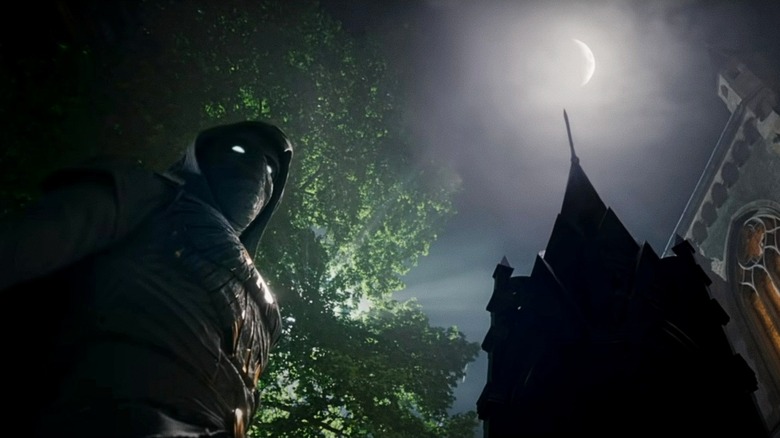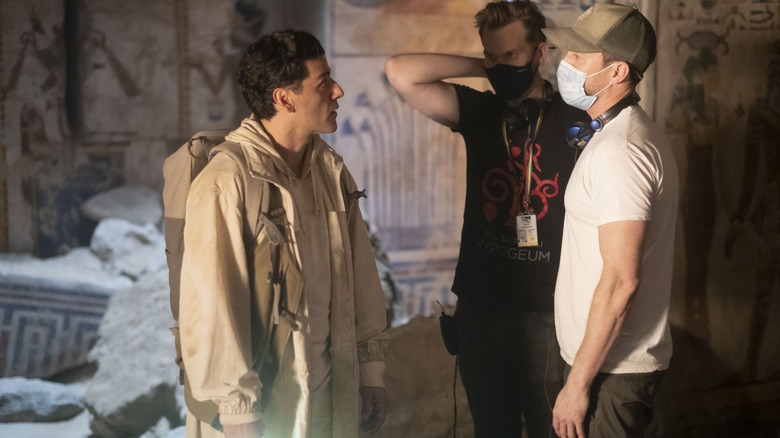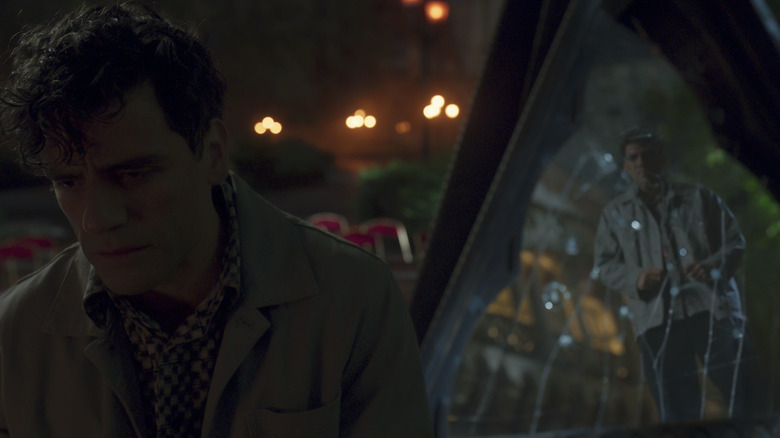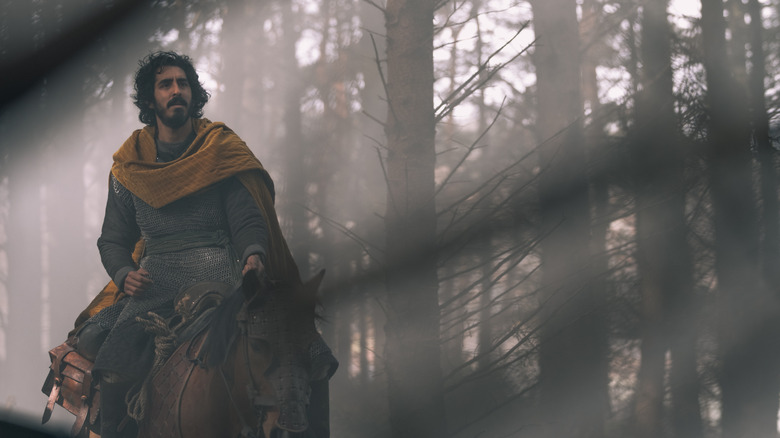Moon Knight Cinematographer Andrew Droz Palermo On Creative Freedom & The Green Knight's Oscars Snub [Interview]
For Marvel fans, the production of "Moon Knight" as a Disney+ streaming series presented a unique opportunity for a uniquely fascinating superhero. Here was a chance for a pair of immediately recognizable stars, Oscar Isaac and Ethan Hawke, to lend a sense of gravity to a character that even the most ardent fans would admit had a lot to prove to mainstream audiences. Steeped in Egyptian mythology and billed in the weeks leading up to release as a departure from the norm of the Marvel Cinematic Universe, Isaac's exceptionally strong work in portraying multiple personalities of the same character has helped turn "Moon Knight" into a show well worth watching. But for those of us equally as interested in the behind-the-scenes talent involved in the production, one name caught our eye in particular: Andrew Droz Palermo, the cinematographer for episodes 2 and 4 of the series.
Palermo has quickly made a name for himself through his collaborations with director David Lowery in recent years, first with 2017's minimalist "A Ghost Story" and again with last year's critical darling "The Green Knight." But much more than simply crafting gorgeous-looking imagery that's perfect for Twitter highlights from fans and crew alike, Palermo bringing his talent and keen eye to the MCU has gone a long way towards making this latest superhero project stand out in all the best ways. Let's put it this way: no matter one's personal opinion on the homogenized visual palette of the MCU overall, it's only fitting that "Moon Knight" would be the one to shake things up a bit.
Simply put, I had no choice but to jump at the opportunity to talk to the acclaimed cinematographer. Throughout the course of our conversation, we discussed what went into his choice to jump from "The Green Knight" to a completely different knight altogether, how much freedom Disney and Marvel allowed him in order to do his own thing, the nitty gritty details involved in bringing certain stand-out sequences to life in the two episodes he worked on with directors Justin Benson and Aaron Moorhead, the challenges involved in filming scenes at night, and finally his thoughts on the Academy snubbing "The Green Knight" at this year's Oscars.
'I think we had a lot of freedom and that wasn't honestly something I was expecting'
I have to start with the fact that when I first sat down to watch "The Green Knight" in theaters, I never would've thought the cinematographer would end up doing "Moon Knight" as his very next project. What drew you to "Moon Knight" in the first place? Are you secretly a diehard comic book fan, or is it just a case of when Marvel comes calling, you pick up the phone, no questions asked?
Yeah, for me as a cinematographer, really it's not wanting to repeat myself often. But another big aspect of that is the filmmakers involved, and Aaron and Justin, I had a really nice meeting with. We had a lot of mutual friends, and so it just seemed like a nice jump into a bigger arena and to do a studio project that I felt aligned with the creators. It felt like that there was space for me to be creative and to do the things that I enjoy doing and also feel I excel at doing. Marvel and Disney were just so supportive of us getting to explore and going to far-out places ... I've been offered big projects before and, for whatever reason, this one just felt like the right one.
You sort of touched on this already, but there's a lot of talk about how much creative freedom Marvel does or doesn't allow to directors. I'm curious, from a cinematographer point of view, what was your experience there?
Yeah, there's parameters that we need to work within, but myself and the other cinematographer, Greg Middleton, I think we had a lot of freedom and that wasn't honestly something I was expecting. I thought there would be a lot more restrictions or things that we could and couldn't do. Honestly, at some point during shooting [laughs], I was like, "I haven't been getting any feedback." I thought I would be getting negative feedback or even just criticisms or things that they might like to see. Finally, I was like, "Justin, Aaron, are you guys hearing anything from up top?" And they're like, "Yeah, they love it. They're just like, 'Keep doing your thing.'" So I was like, "Okay, that's awesome."
There's technical things that you just need to have in consideration, like the delivery specs. They want to shoot in 4K HDR, finish in HDR, and I'm happy to do that. I really love the home viewing experience right now on 4K HDR. I think it's beautiful, and it's so immersive and I'm lucky to have a really nice TV myself and great sound at home. If I can't be in a theater, it's a really nice experience aside from being in a theater.
'I look at each space as its own character'
In episode 2 of "Moon Knight," I noticed there's a pretty broad range of settings and locations that you have to work with — from the harshly over-lit museum scenes to sort of the high contrasts of the storage unit and also that acid-washed environment with Arthur Harrow towards the end. So from a lighting perspective, how are you trying to unify all these distinct sequences?
I think you kind of look at each space — at least, I do — I look at each space as its own character, and I try not to force something onto a location that it doesn't already have. This museum space was a real museum and when you walk into it, you see, it's filled with lots of nice soft daylight. But our show has an air of mystery into it. So, I wanted to bring in a bit of shadow where there wasn't shadow in a museum.
And then as far as city streets, I wanted to make it feel interesting for us to be there, for as long as we were there. And I kind of went with the sodium vapor look of a really orange exterior, kind of older street lights, which are now all being replaced of course [laughs], with clean white LEDs. But as [Marc Spector] climbs and is up on the rooftops, it's a much cleaner look. He's more moonlit, and so it's cleaner. So you just try to look at each of these scenes and track it over the course of the thing and make sure you don't go too far in one way so that it all falls apart and you're not shooting the same show anymore. There needs to be little hints of what was coming before and what's coming after, so that it feels like a unified piece.
Personally, my favorite scene in that episode is towards the end when Marc and Steven are having that argument with each other. Some of my favorite elements are the moonlight streaming through the trees, just the way Marc is framed in the shots, sort of dominating it while Steven is kind of shrinking in that mirror that they have to talk through. What do you remember most about filming that sequence?
Well, thanks, I really like that sequence. And that was one that we had talked a lot about because we knew we wanted to use some sort of older filmmaking techniques so that we could make it feel like it, at times, was longer takes. And so Aaron and Justin and I on stage had a pyramidal structure made that was somewhat reflective. And so Aaron was acting as Oscar, and we were kind of working out our camera movements, how it would pan up to Marc and then down to Steven and back up to Marc and kind of be revolving around the three sides of the pyramid. So that was one that we had done a lot of advanced work on, but it was also an incredibly hard technical challenge of figuring out the reflections as well as an acting challenge for Oscar to bounce from character to character.
And as is true for any nighttime scene [laughs], it's in the middle of the night, you're tired, you're having to fight the exhaustion of switching your internal clock. And ... [at] the end of a shooting day, the sun starts coming up, and you're starting to hear the birds and it's like, "Oh my gosh, we have so much to shoot still," and these birds are already starting [laughs], you know, it's coming. I'll always remember that: the changing of the sky and that, oh, you're getting close to the end here, so you better hurry up. That's true for every nighttime scene. It doesn't matter how great you're shooting, it always ends that way.
'[The Green Knight is] such an idiosyncratic movie, it's so strange'
Moving on to episode 4, I want to ask about the challenge of scenes taking place at night and in dark interiors. "Game of Thrones," in its final season, I remember one episode came a little under fire because everybody complained they couldn't see what was happening in this big battle sequence. Was that in the back of your mind at all?
I think under exposure is [laughs], it seems like it's a point of contention for a lot of people and like, "How dark is acceptable?" I have a nice TV at home and I can see it in a way that is bright and I know that in the 4K HDR, it looks like it should. So you kind of just worry about how underlit can you get, what's acceptable for everyone's TV. Because I'm in a good environment when I'm in the post-production facility, it's as good as it's going to get there. Everything's calibrated, the monitors are incredible, but you have to remember not everyone has this experience. Not only in the environment that you're coloring in — which is quite dark, there's no windows — but also their TVs aren't as nice.
So you kind of try to meet somewhere in the middle. For the scene with Layla, I tried to over light so that I knew we could pull it down or go up if we needed to. That's generally my methodology, is to do a little more and then bring it down, just so I don't paint us into a corner where you can't see anything. But it is frustrating, I'll say just as a cinematographer, when people report that they couldn't see anything. Because as I've mentioned, the viewing experiences in post-production are so good. I know that you should be seeing something. And I know I push things to their limit sometimes, but I know when I'm watching something, I know exactly where I am. So maybe sometimes it's compression. Maybe it's sometimes a streaming service, or one's TV, but it can be frustrating to not have a unified, everyone seeing it the same way.
And the same is true even for theaters. Projectors can be dim, they may not have changed a bulb in a while. So it's a challenge. I feel like horror scenes need darkness. However, you have to keep in mind that not everyone can see everything at every time [laughs]. So it's a real challenge.
I couldn't let you go without mentioning "The Green Knight." I absolutely loved your work on it. Are you as bothered as I am that it kind of just got shut out by the Oscars?
I was so pleased that that movie got out as wide and seen by as many people as it did. It's such an idiosyncratic movie, it's so strange. We did some really cool stuff in that movie. I'm so proud of it, photographically. I was highlighted by a number of critics awards and things like that so, of course, I'm more than thankful. I never in a million years would've thought we would've been in even conversations about movies that were missed by the Oscars. So I never, ever expected us to be in Oscar contention. So maybe there's a movie down the road that we'll be in that kind of talk, but it was definitely not this one. I'm just so glad that so many people saw it.
"Moon Knight" episodes 1-4 are available now on Disney+. Episode 5 releases on Wednesday 27 April, 2022.



